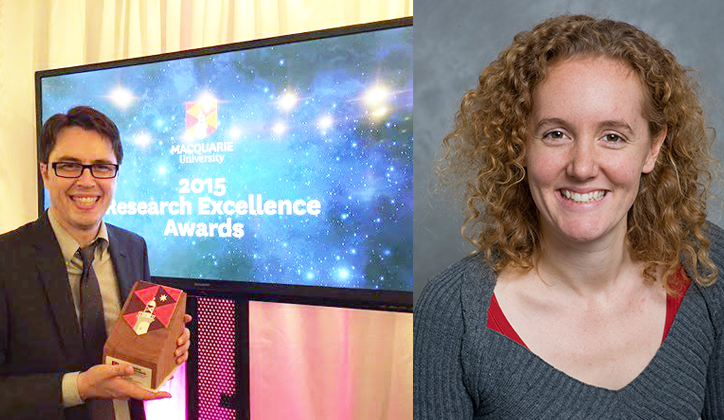From galaxies far far away to representing the brain, Early Career Research shared the spotlight at the 2015 Research Excellence Awards.
Macquarie University Early Career Researcher of the Year
This award recognises outstanding performance in research by an early career researcher who is within five years post-completion (formal award) of his/her PhD, MPhil or MRes degree. There are two awards within this category – and our winners are:
Dr Lee Spitler
Early Career Researcher of the Year – Engineering, Medicine and Science
“I am honored to receive a Research Excellence award and look forward to promoting the high-impact research being conducted by Macquarie Early Career Researchers. I also want to acknowledge the supportive research environment Macquarie provides to its early career researchers.”
About Lee’s work
Lee’s research develops methods to maximise the information extracted from telescope observations to allow the charting of previously unknown aspects of the universe and provide a gateway to new and original research investigations.
Lee focuses his research on galactic structures. Not only do they – in his opinion – constitute the more interesting components of the universe, but they also serve as bright beacons that can be observed nearly to the edge of the universe. Models of galaxy formation and evolution underpin much of the observations interpretation and theoretical modelling in the entire field of astrophysics. Lee aims to develop a timeline of galactic evolution over the last 13.7 billion years.
Lee has extensive experience in establishing observational strategies for effective telescope use. He knows how important it is to provide real time data quality control at the telescope and how time consuming it is to prepare image datasets for scientific use – typically months of work. 1.3 million individual images (10 Terabytes worth) from 45 nights of observing over a 2-year period will convert into 18 science-ready images taking up only 1.5 Gigabytes.
Dr Alexandra Woolgar
Early Career Researcher of the Year - Business, Humanities and Social Sciences
“I am delighted to have received this award. I have found Macquarie to be a uniquely supportive environment in which I have had unparalleled opportunity to develop my research and I am excited to see what opportunities this early recognition will open for me in my future career. I would like to thank my collaborators, mentors and students, and acknowledge the unique academic environment of the Department of Cognitive Science, for supporting me to thrive at Macquarie.”
About Alexandra’s work
Alexandra’s work was the first to demonstrate that many human brain regions are adaptive. Once thought of as a fixed input/output system, the brain turns out to be far more dynamic, interactive and flexible than previously imagined.
Alexandra has been instrumental in developing new methods for neuroimaging that allow probing of brain activation in new ways. These methods go much further than simply asking which regions of the brain are active but also what information is represented by those active regions. This research has changed the way that human brain function is understood and leads into deeper questions regarding what information is coded into difference brain regions.
Non-invasive imaging such as MEG provides millisecond-level information about the temporal sequence of activity in different brain areas. Not only does this facilitate the identification of what information is coded where, but also the precise moment when coding occurs in the brain. This provided fundamental insights into how information is processed through time across different regions in the brain.
Congratulations to both Lee and Alexandra, along with all those highly commended for this award.

